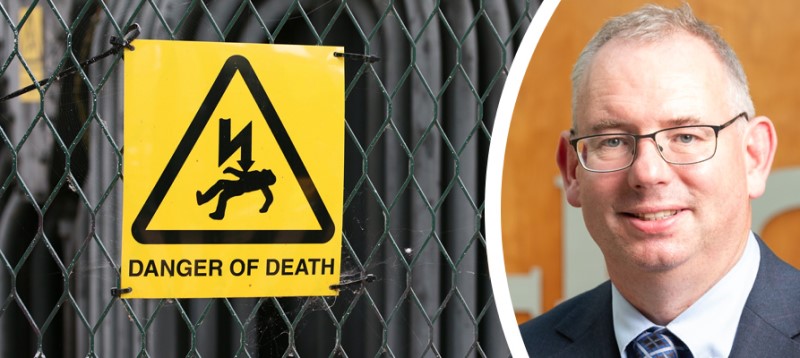SELECT MD urges regulation is essential for electrification of society

Alan Wilson
SELECT managing director Alan Wilson has told thousands of podcast listeners that there are “no second chances” with electrical safety – and it is vital that consumers know that the electricians they use for the ongoing electrification of society are qualified and competent.
Speaking on the popular Independent Minds podcast, the MD of Scotland’s largest construction trade association said that regulation of the electrical industry was essential to maintain standards and safety in a society which is increasingly dependent on electricity.
In his conversation with Abeceder’s Michael Millward, he said the profession was determined to get a bill through the Scottish Parliament and make protection of title for qualified electricians a reality.
Alan told listeners: “We used to say that the future is electric, but the fact is that the electrification of society is now a reality – nothing works without it. Electricity powers our offices, factories, homes, hospitals and shops. It provides our heating, hot water, air conditioning, solar panels and electric vehicle (EV) charge points.
“Thirty years ago, if there was an electricity problem, it was merely an inconvenience – its main use was lighting. Now, the impact of any outage is huge and if we don’t have something like the internet it is a major problem as everyone depends it.
“That is why the campaign to make sure that electricians are properly trained and regulated is so important. A lot of people assume that is already the case, as it is with gas fitters, but the fact is that anyone can trade as an electrician without fear of penalty.”
He stressed that it was more important than ever to continue the drive for protection of title of electricians – a campaign which SELECT has been spearheading for many years. He said: “Some people may have a tacit understanding of ‘plug-and-play’ electrics, using existing circuits, but they don’t understand that every few years the Wiring Regulations are updated and new requirements come into play.
“Wiring and installation is safety critical and you can’t take any risks. Electricity can kill – there are no second chances. Also, with electricity, many issues are concern latent defects, which can lie undetected and undisturbed for some time until someone uncovers them and reveals a serious problem.
“For most of us, electricity is just light switches and sockets; we don’t see all the cabling and circuits behind it and if we use someone unqualified to work on it, it can have potentially life-threatening consequences.”
Alan agreed with host Michael that if something goes wrong with electricity, a spark could cause a fire or someone could be electrocuted, and said he had heard first-hand about electrical fatalities from SELECT members.
He added: “The electrical sector is completely safety-focused. SELECT is heavily involved in apprentice training and their first module is all about safety. They cannot go out to work in a home or on a site until their safety assessment has been carried out. However, this loophole still exists.
“Politicians are surprised and horrified that anyone can operate as an electrician, but they are not yet horrified enough to do anything about it. We have been working on the campaign for a number of years and we have politicians of all persuasions signed up to it, but for a number of reasons such as the parliamentary schedule, it has not yet passed.
“The Scottish Parliament has the competence to enact regulation, but the Internal Market Act means that we will have to draft the Bill to ensure that we are not locking out anyone in the rest of the UK who wants to work in Scotland. We also need Parliamentary space and time.”
Alan said the list of regulated professions contained obvious occupations such as teachers, solicitors, doctors, air traffic controllers and nurses, buy also included less obvious roles such as dental hygienists, farriers and door supervisors, or nightclub bouncers. He pointed out that legislative complexity in a mature society such as the UK could sometimes hinder progress, and more modern democracies such as the US, Australia and African countries such as Zambia had introduced regulation of electricians.
He concluded: “Electrical work is now so complex that it is more important than ever to know that systems are safe and that those who work on them are properly trained and qualified. It needs to be a profession.”




















